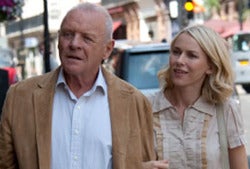 Woody Allen may be Jewish but he easily could be the poster boy for the Protestant Work Ethic.
Woody Allen may be Jewish but he easily could be the poster boy for the Protestant Work Ethic.
The now 74-year-old Allen is always working, turning out a movie almost yearly since “Take the Money and Run” in 1969, making him a veritable Joyce Carol Oates of cinema.
His prolificacy has its pluses and minuses, both of which are in evidence in his latest, “You Will Meet a Tall Dark Stranger.” He wrote and directed this one but doesn’t — as he hasn’t in most of his work in the past decade — star.
The greatest plus to Allen’s prodigious output is that he gets to re-examine various obsessions and themes, coming back to them again and again over the decades. He’s like a lapidary getting another crack at perfectly polishing an old stone.
The greatest minus: Too often, especially of late, his scripts seem dashed off and put before the cameras too soon. They would benefit mightily from another pass or two through his typewriter. (Yes, he still uses one, per a recent Q&A in the New York Times.)
Looking back over Allen’s body of work, there are films that are memorable (“Annie Hall,” “Hannah and Her Sisters,” “The Purple Rose of Cairo,” plus plenty more) and those whose titles summon up only the wispiest of recollections (“Shadows and Fog,” “Deconstructing Henry,” “Celebrity”).
In the past decade, the misses (anyone remember “Melinda and Melinda” or “Cassandra’s Dream”?) have come more frequently than the hits, with “Match Point” and “Vicky Christina Barcelona” being his only solid gold scores.
Not that there aren’t still pleasures to be had in any Allen movie. He always gets a top-notch cast and there are invariably lines or a character worth relishing. Think of Patricia Clarkson’s religious fanatic-turned-bohemian floozy in last year’s otherwise mediocre “Whatever Works.”
Which brings me to “Tall Dark Stranger,” a springy confection but with a center made up of the bitterest dark chocolate. This is mid-drawer Allen — it’s neither his best nor his worst work.
Put another way, you’ll be happy sitting through it but you won’t be tweeting, “It’s an absolute must-see!” as you emerge from the theater. (Though I will be making use, in the next week or two, as cocktail party chatter a hilarious throwaway bit where a dim bulb of a character complains after seeing Ibsen’s “Ghosts” — she’d gone expecting a horror story — that it wasn’t the least bit scary.)
“Tall Dark Stranger” is an ensemble piece with characters in London whose lives partially overlap. There’s an aging businessman (Anthony Hopkins) who, panicking at the notion that he’s edging close to his twilight years, leaves his longtime wife (Gemma Jones) and marries a call girl (Lucy Punch). The ex-wife, after repeat visits to a fortune-teller, eagerly buys into the notion of reincarnation.
The divorced couple’s adult daughter (Naomi Watts) longs to have a baby with her husband (Josh Brolin), a novelist who has never been able to replicate the success of his first book. He, while waiting to find out if his publisher likes his latest novel, begins flirting with a comely neighbor (Freida Pinto).
Every single person in the movie wants something he or she doesn’t already have, whether it is a new love, a new business or artistic success. Reaching for it, Allen seems to tell us, only will lead to unhappiness. The grass on the other side is rarely greener, but rather scorched and full of empty patches.
In the end, the only truly happy people in the film are the delusional ones. Every one else has come up against the impossibility, or emptiness, of reaching their desired goal.
The need for longing and illusion, and the disparity between what we want and what’s really out there, are themes that Allen has touched on before in films like “The Purple Rose of Cairo,” “Crimes and Misdemeanors” and “Match Point.”
The older he gets, the less hopeful he seems. All the angst and striving are for naught. The gap is gaping between what we want and what actually is, Allen is saying. But even accepting that won’t make you happy. In the end, the happiest among us – or, at least, up on screen in “Tall Dark Stranger” – are the dottiest, those least connected to reality.
It’s a pessimistic view of the world, and yet Allen keeps managing to mine it for humor. There’s mirth in being cheerfully hopeless.


